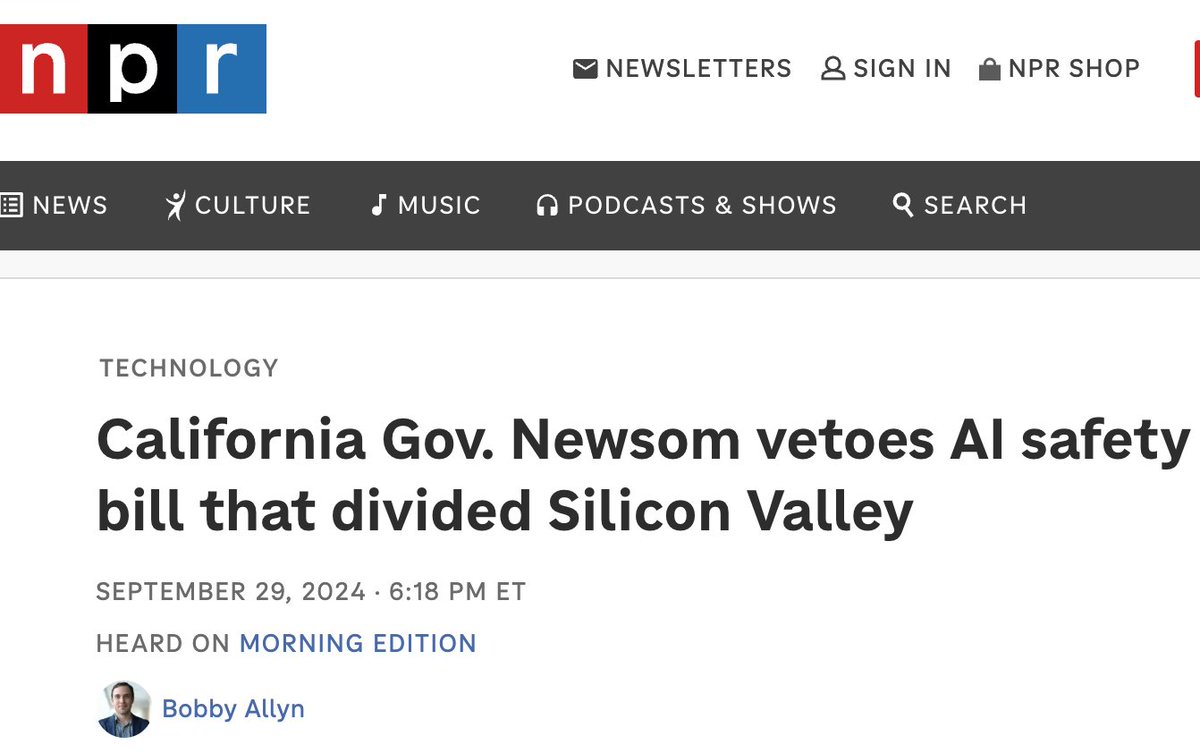I wrote a long 🧵 yesterday on my puzzlement about the chatter that @GavinNewsom or his advisors might think it'd be politically prudent to veto SB 79.
Today I'll explain why I don't think he'll cave.
tl,dr: he's a bold idealist and fundamentally good on housing!
1/🧵
Today I'll explain why I don't think he'll cave.
tl,dr: he's a bold idealist and fundamentally good on housing!
1/🧵
Context: I don't know Newsom or any of his top advisors personally. (I met him once at a law-school commencement ceremony, that's all.)
But I've watched him for a long time, first as my mayor in San Francisco, then as Lt. Governor and Governor.
/2
But I've watched him for a long time, first as my mayor in San Francisco, then as Lt. Governor and Governor.
/2
His defining quality as a politician is a willingness, even an eagerness, to make big, idealistic bets on the future.
He's a first mover, always looking for the new thing.
/3
He's a first mover, always looking for the new thing.
/3
The best example? As a newly elected mayor in 2004, he directed the county clerk to issue marriage licenses to gay & lesbian couples, in violation of a ballot measure that banned same-sex marriage.
An epic constitutional battle ensued, in which Newsom was ultimately...
/4
An epic constitutional battle ensued, in which Newsom was ultimately...
/4
There are many other examples too:
- he was an early proponent of cannabis legalization
- he vetoed a protectionist bill that would have thwarted development of self-driving trucks
/6

- he was an early proponent of cannabis legalization
- he vetoed a protectionist bill that would have thwarted development of self-driving trucks
/6


- he vetoed an AI safety bill that critics said was way too cumbersome; then commissioned an experts' report on AI safety and worked w/ @Scott_Wiener and others to hash out a successor AI safety bill, which he just signed into law
/7
politico.com/news/2025/09/2…
/7
politico.com/news/2025/09/2…

- he's been doggedly determined to salvage high-speed rail, notwithstanding the many terrible decisions by his predecessors' appointees that had made it an all-but-unworkable project by the time he assumed office
/8
latimes.com/california/sto…
/8
latimes.com/california/sto…
- from his 2013 book to the guest list of his recent podcasts, Newsom has been at the forefront of thinking about how the technological and media environment shapes politics and opens lanes for candidates
/9
youtube.com/@ThisisGavinNe…



/9
youtube.com/@ThisisGavinNe…




- And most notably for present purposes, he was an early and prominent enthusiast of @ezraklein & @DKThomp's Abundance.
/10
/10

His Abundance rhetoric came matched w/ action:
Newsom used his leverage over the budget to pull off transformative CEQA reforms, which he rightly described as "the most consequential housing reform in modern history in the state of California."
Newsom used his leverage over the budget to pull off transformative CEQA reforms, which he rightly described as "the most consequential housing reform in modern history in the state of California."

In addition to being a forward-thinking idealist by nature, Newsom has long been good on housing specifically.
- He announced audacious housing production goals as a candidate for Governor.
/13medium.com/@GavinNewsom/t…
- He announced audacious housing production goals as a candidate for Governor.
/13medium.com/@GavinNewsom/t…
- With the exception of one trivial bill on reporting requirements, he's signed every piece of prohousing legislation that's been presented during his tenure
/14
/14
- He's transformed @California_HCD from a minor department that just oversaw the cumbersome "housing element" law, to a powerful agency that enforces a broad suite of state laws through its Housing Accountability Unit.
/15
calmatters.org/housing/2021/1…
/15
calmatters.org/housing/2021/1…

@California_HCD - He's signed executive directives to make *lowering the cost* of infill development a priority for building code and other regulatory updates
/16
/16
https://x.com/CSElmendorf/status/1818754922487431428
@California_HCD I have my quibbles with Newsom. I think there are opportunities he's missed, both administratively and in his engagement with the Legislature.
But, big picture, he's been an excellent governor on housing.
/17
But, big picture, he's been an excellent governor on housing.
/17
@California_HCD Signing SB 79 would cement his legacy. It's the bookend to "the Lord's work" (per Jerry Brown) of clearing away CEQA for infill housing.
/18
/18
@California_HCD Implementation of SB 79 will largely fall to Newsom's successor. But by signing the bill, Newsom sets the stage for his successor to succeed.
Decades from now, he'll be able to look back at SB 79 and the CEQA reforms and say, "Yeah, I turned the ship around."
/19
Decades from now, he'll be able to look back at SB 79 and the CEQA reforms and say, "Yeah, I turned the ship around."
/19
@California_HCD So, even if he or some of his advisors may be a little anxious about NIMBY pushback, I think he'll sign SB 79, b/c at root because he's a forward-thinking idealist who understands that building loads of dense housing near transit would be a huge win for CA & the nation.
/end
/end
@threadreaderapp unroll
• • •
Missing some Tweet in this thread? You can try to
force a refresh













